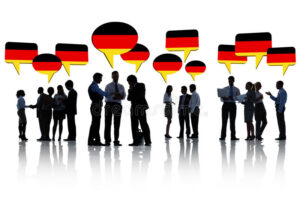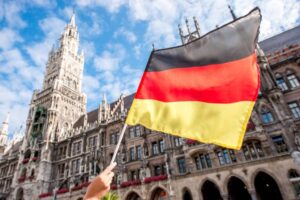How ENGLISH became the most spoken language…
Five hundred years ago, five to seven million people spoke English, almost all lived on the British Isles. now, until 1.8 billions of people worldwide speak English.
How did this happen?
The growth of the English language has nothing to do with the structure of the language, or any other quality,everything has to do with politics.
British Empire
After being developed for almost a millennium in the British Isles, English was taken around the world by sailors, soldiers, pilgrims, merchants and missionaries of the British Empire. At the time something resembling a language policy was introduced, English had already reached all corners of the globe.
For example, English-speaking Puritans were not the only Europeans to arrive in North America: Spanish, French, Dutch and German were also widely spoken. All languages were amplified by waves of immigration from Europe in the following centuries.
For, in the United States drafting process, the founders of the US knew the importance of language for national identity. English was the majority spoken language and should be encouraged. Recently as the beginning of the Century 20, some states banned the teaching of foreign languages in private schools and homes. The U.S. Supreme Court only hit restrictions on private language education in 1923.
Today too, English is not the official language of the US, but there is no doubt that it is the dominant language.
And it was not just America that said “hello” in English. At one point in the early twentieth century, The British Empire expanded to almost a quarter of the world's surface, not including the US. According to a popular saying, “the sun never set in the British Empire”.
Nowadays, the sun has set in the empire, but English remains an important language in every former colony.

Missing but not forgotten…
In most of the British Empire, the main purpose was trade, the fewer Britons actually settled. This explains why English did not come to dominate the colonies in Asia and Africa, where was the language of business, administration and education, but not the language of the people.
To date, English has a major administrative role in these former colonies. For a long time, entering English meant access to education, whether in mission schools in Africa or in the first universities in India. This created an English-speaking elite in some of the world's most populous countries and the elites are good at self-preservation.
After independence, many countries became officially multilingual for the first time, but different groups needed a language to communicate with each other and with other nations. BACK, this was English. English is now the predominant or official language in 75 TERRITORIES: a direct legacy of the British Empire.
In places where large colonies of colonists were formed, such as Australia, Canada and the US, native languages and cultures have been pushed towards extinction by the presence of English.
It was not the first language of European colonialism; The Portuguese and Dutch left the continent earlier. AND, recently in the 19th century, English was not the lingua franca of the world (as the term suggests, French was the number one language of international communication). So something must have happened recently to give the language its unique international status.
Without the rise of the US in the Century 20, the language landscape in the world would look very different.
Two world wars and the rise of the US

While Europe was being rebuilt in the years that followed 1945, The US flourished. American businesses took the place where the British venture of India ceased centuries ago, taking English worldwide as a commercial language. The Impact of American Business, combined with the English tradition left around the world by the British Empire, have made English the number one language of international trade in the Century 21. All the major business schools in the world now teach English.
English is now the most widely spoken foreign language in 19 that 25 EU Member States where it is not an official language. 6 countries where English is not number one also show the importance of politics in language policy: Russian is the most widely spoken foreign language in Lithuania, Latvia and Estonia; Croatian is most often spoken in Slovenia; and the most spoken Czech in Slovakia.
But the cultural heritage of the post-war decades is also very important for the growth of English as a world language..
As well as sending money across the Atlantic, The US secured the soundtrack through rock and roll, jazz and, Later, disco and hip hop. Hollywood movies became global sensations and American TV series became cultural landmarks. American culture was everywhere, radiating confidence and success; only things for a world that had been destroyed by war.
It was not just American music that brought English to the discos and homes of the world. British bands, including the Beatles, Rolling Stones, Queen, Pink Floyd, Police or Led Zeppelin ensured that Britannia ruled in the air waves, if not waves.
The hippie movement came from San Francisco and London. Music festivals, including the Isle of Wight and Woodstock, became iconic for an entire generation, whether English-speaking or not.
it “soft power” continues today
English is "cool"
Advertisers take pride in getting on the cultural zeitgeist; creating consumer desire through making sex products. One of the ways they do this is through the use of English words. Look at the German examples of Der Spiegel, the French ones of Slate.fr and the Italian ones of La Repubblica.
Many examples of English in advertising come from multinational companies, who want to keep their message consistent across markets, but some examples are local firms looking for that elusive element of fascination that English can bring. certainly, this also happens in English: haute couture and Eau de Toilette sound much sexier untranslated.
Bands release their work in English to reach the largest possible audience. Even filmmakers. This invisible pressure to produce creative works in English adds to the cultural momentum that language developed in the second half of the twentieth century..
The language of the extreme sports style is English: snowboarders ollie, fakie and rodeo be they canadian, Swiss or Japanese.
The word itself “cold” is assimilated into different languages.
Science & Technology

The global power of the US coincided with the birth of popular computing, and English is the language of the technological revolution and the Internet. Consider a keyboard for example; they are created for Latin letters, so do speakers of Asian languages (SPECIALLY) use complicated techniques to enter words.
What happens inside the devices is also dominated by English. The US remains the most technologically innovative nation and, because of the language policy of the nation's founders, English is the dominant language.
PULL NOT PUSH
In addition to the efforts of some early colonizers, hundreds of years ago, English success has more to do with “withdrawal” than “thrust”. People in British colonies who wanted an education would get that education in English. Artists who want to reach the largest audience for their work can do it in English. If you want to trade internationally, you will need to speak English. And you do not have to speak English to have a successful career, but it certainly helps you.
Will English remain number one?
Some people suggest that English has become ubiquitous because it is “easy to learn” or particularly flexible, but a look back suggests that this is irrelevant. Despite a complex system of issues , Latin was the most influential language of Europe for over a thousand years (and her offspring are still going strong). People learned Latin then for the same reasons they learn English now: move forward in life and have access to knowledge. STILL, Latin is spoken only by priests and scholars.
Languages and boundaries change over time, but English is likely to remain the number one language in the world during our lifetime.



